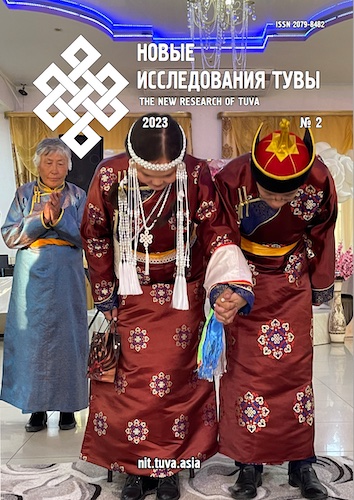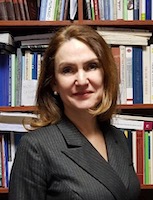Non-profit organizations of Tuva as subjects of demographic policy implementation
DOI:
https://doi.org/10.25178/nit.2023.2.7Keywords:
demographic security; demographic policy; non-profit organization; Tuva; Republic of TuvaAbstract
The article discusses the issue of the use of potential of non-profit organizations as subjects of demographic policy implementation drawing on the example of the Republic of Tuva.
There were 82 socially oriented non-profit organizations in Tuva at the end of 2022 (15% of the total number of NGOs). Their activities are aimed at solving social problems and developing civil society in the region. They are also to a different extent related to the implementation of the demographic policy of the Russian Federation. In accordance with the objectives of the state demographic policy of Russia the identified NGOs are classified as contributing to reduce premature mortality of Russian citizens, to promote the health of residents of Russian regions, to increase the birth rate in the country, to strengthen the traditional family, to preserve spiritual and moral values and to provide social integration of migrants. The authors note some specific names of NGOs that correspond to certain tasks and that have already been supported by grants, first of all by the Presidential Grants Fund.
References
Abylkalikov, S. I. (2021) Osobennosti demograficheskogo razvitiia Tuvy: vklad migratsii v demograficheskii balans [Features of the demographic development of Tuva: Contribution of migration to the demographic balance]. New Research of Tuva, no. 4, pp. 131–142. (In Russ.). DOI: https://doi.org/10.25178/nit.2021.4.10
Abylkalikov, S. I. and Baimurzina, G. R. (2022) Osobennosti demograficheskikh protsessov v gorodakh Kyzyl i Elista v 2011–2020 gody: sravnitel’nyi analiz [Demographic processes in the towns of Kyzyl and Elista in 2011–2020: A comparative study]. New Research of Tuva, no. 2, pp. 34–52. (In Russ.). DOI: https://doi.org/10.25178/nit.2022.2.3
Babenko, A. I. and Kuular, L.Y. (2008) Integrirovannaia otsenka demograficheskoi situatsii i poter' zdorov'ia naseleniia na otdel'nykh territoriiakh Respubliki Tyva [Integrated assessment of the demographic situation and health losses of the population in certain territories of the Republic of Tuva]. Biulleten' SO RAMN, no. 3 (131), pp. 28–32. (In Russ.).
Besschetnova, O. V., Volkova, O. A., Aliev, Sh. I. and Besschetnova, O. V. (2021) Otnoshenie molodezhi k vaktsinoprofilaktike grippa v usloviiakh razvitiia pandemii COVID-19 [The attitude of the youth to vaccine prevention of influenza in conditions of COVID-19 pandemic]. Problemy sotsial'noi gigieny, zdravookhraneniia i istorii meditsiny, vol. 29, no. 2, pp. 213–219. (In Russ.). DOI: http://doi.org/10.32687/0869-866X-2021-29-2-213-219
Gaifullin, A. Yu. (2022) Etnodemograficheskie kharakteristiki molodezhi v respublikakh Tyva i Bashkortostan [Ethnodemographics of youth in the republics of Tuva and Bashkortostan]. New Research of Tuva, no. 2, pp. 128–142. (In Russ.). DOI: https://doi.org/10.25178/nit.2022.2.9
Ilyin, V. A. and Morev, M. V. (2022) Spetsial'naia voennaia operatsiia vyiavliaet novye cherty grazhdanskogo obshchestva [The special military operation reveals new features of civil society]. Economic and Social Changes: Facts, Trends, Forecast, vol. 15, no. 5, pp. 9–32. (In Russ.). DOI: https://doi.org/10.15838/esc.2022.5.83.1
Lavrenyuk-Isayeva, N. M. (2022) Rol’ sotsial’nogo predprinimatel’stva v chelovecheskom razvitii Respubliki Tyva [The role of social entrepreneurship in the human development of the Republic of Tuva]. New Research of Tuva, no. 4, pp. 190–212. (In Russ.). DOI: https://doi.org/10.25178/nit.2022.4.15
Mersianova, I. V., Ivanova, N. V. and Briukhno, A. S. (2022) Izmenilas' li tsifrovaia kompetentnost' rossiiskikh NKO v usloviiakh pandemii? [Digital transformation of Russian NGOs during the pandemic]. Sotsiologicheskie issledovaniia, no. 9, pp. 38–48. (In Russ.). DOI: https://doi.org/10.31857/S013216250020647-4
Mozgovaya, E. I., Vodolazova, Zh. M., Gorsky, A. A. and Volkova, O. A. (2021) Zdorovyi obraz zhizni naseleniia v usloviiakh pandemii: ekspertnye mneniia issledovatelei i predstavitelei nekommercheskikh organizatsii [Healthy lifestyle of the population in the context of a pandemic: Expert opinions of researchers and emploees of non-profit organizations]. Problemy sotsial'noi gigieny, zdravookhraneniia i istorii meditsiny, vol. 29, no. S1, pp. 763–767. (In Russ.). DOI: https://doi.org/10.32687/0869-866X-2021-29-s1-763-767
Ryazantsev, S. V. and Miryazov, T. R. (2021) Demograficheskoe blagopoluchie: teoreticheskie podkhody k opredeleniiu i metodika otsenki [Demographic well-being: Theoretical approaches to definition and assessment methodology]. DEMIS. Demographic Research, vol. 1, no. 4, pp. 5–19. (In Russ.). DOI: https://doi.org/10.19181/demis.2021.1.4.1
Skobelina, N. A. (2022) Nekommercheskie organizatsii v Respublike Tyva s 2015 po 2021 gody: zavisimost’ ot puti [Non-profit organizations in the Republic of Tuva from 2015 to 2021: Path dependence]. New Research of Tuva, no. 4, pp. 180–189. (In Russ.). DOI: https://doi.org/10.25178/nit.2022.4.14
Tarbastaeva, I. S. (2018) Tuva prevrashchaetsia v monoetnichnyi region: riski i perspektivy [Tuva’s transformation into a monoethnic region: Risks and possibilities]. EKO, no. 5 (527), pp. 65–80. (In Russ.).
Gorman, M. (2002) Global ageing — the non-governmental organization role in the developing world. International Journal of Epidemiology, vol. 31, issue 4, pp. 782–785. DOI: https://doi.org/10.1093/ije/31.4.782
Momoh, G. T., Oluwasanu, M. M., Oduola, O. L., Delano, G. E. and Ladipo, O. A. (2015) Outcome of a reproductive health advocacy mentoring intervention for staff of selected non- governmental organisations in Nigeria. BMC Health Services Research, vol. 15, article number: 314. DOI: https://doi.org/10.1186/s12913-015-0975-0
Olson, M. (1965) The logic of collective action: Public goods and the theory of groups. Cambridge, MA, Harvard University Press. x, 176 p.
Volkova, O. A., Naberushkina, E. K., Besschetnova, O. V., Mozgovaya, E. I. and Svishcheva, I. K. (2018) Life stories of women: Terminated parental rights. Journal of History Culture and Art Research, vol. 7, no. 2, pp. 139–145. DOI: http://doi.org/10.7596/taksad.v7i2.1597
Published
How to Cite
For citation:
Volkova O. A. and Osadchaya G. I. Nekommercheskie organizatsii Tuvy kak sub»ekty realizatsii demograficheskoi politiki [Non-profit organizations of Tuva as subjects of demographic policy implementation]. New Research of Tuva, 2023, no. 2, pp. 99-110. (In Russ.). DOI: https://doi.org/10.25178/nit.2023.2.7
Issue
Section

This work is licensed under a Creative Commons Attribution-NonCommercial 4.0 International License.

Author(s) license holder(s) grant rights for their work to the journal (grantee of a license) under the simple non-exclusive open license in accordance with Art. 1286.1 «Open license for a research work, work of literature or fine arts», Civil Code of the Russian Federation.
New Research of Tuva publishes articles under the Creative Commons Attribution-NonCommercial license (CC BY-NC).
Since it is an open license, author(s) reserve the right to upload the article to their institutional repository, submit it to another journal (if it allows republications), or republish it on their own website (in full, or in part).
However, several conditions apply here:
a) The republished version must always contain the name(s) and affiliation(s) of the author(s), the original title and the hyperlink to the original version on the New Research of Tuva website;
b) It must be in open access, free of charge, and no category of readers must be in any way whatsoever advantaged over general readership.
c) should the contribution be submitted elsewhere by its author(s) without substantial modification (30% or more of original text unchanged), the body of the article should contain a disclaimer that the original version was published in New Research of Tuva (with a link to the respective page)
The CC-BY-NC is a non-revocable license which applies worldwide and lasts for the duration of the work’s copyright.










